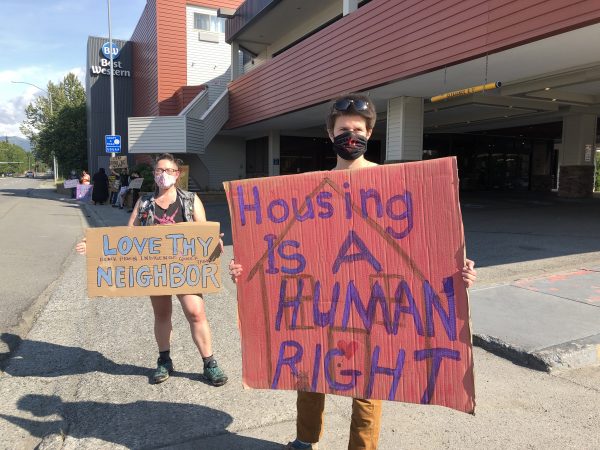
Nearly thirty hours of in-person public testimony on a city plan to purchase property for a treatment center, housing and other homelessness services wrapped up last week. While the assembly says they’ve received thousands of emails in support of the plan, the majority of hundreds of in-person testifiers were against it.
Some of the negative testimony was fueled by a conservative opposition group called Intervention 2020.
People testifying against the property purchases this month said they were concerned about the planning process, threats to neighborhood safety and declining property values in the areas around proposed locations for the new housing and resource facilities for the homeless.
Proposing alternative solutions, some residents referenced Intervention 2020, a campaign organized online and spearheaded by Nick Begich Jr., the brother of former U.S. Senator Mark Begich, and Anchorage businessman David Cuddy.
“We found a way to whip up the public sentiment to make sure you guys would at least hear that,” Begich said, speaking to the assembly on the last day of testimony last week. “This is what people want to have addressed, the criminal things that are destroying the city that aren’t addressed. They should be addressed first.”
The platform emphasizes increased prosecution for minor crimes like trespassing, public intoxication and creating a public nuisance. And, it lays out a controversial plan, what organizers call a “tough love” approach to housing the homeless through “forced incarceration and treatment” at the Palmer Correctional Facility.
The plan may not be legal. Dan Coons, director of Alaska Legal Service’s Fair Housing Project, says prosecuting low-level offenses is unnecessarily expensive, and in some cases unconstitutional. He argues that the plan unfairly penalizes people for the act of being homeless.
“Saying that we’ll send you off to be put in a former prison facility and force you to go there, simply because you’re violating trespassing ordinances… If you’re homeless, you know, you’re probably going to be doing that as a matter of what you’re doing to live your life [if] you don’t have shelter and a home to go to.”
Coons says forcibly relocating people, especially those suffering from alcoholism or addiction, would violate the Fair Housing Act.
During his testimony, Begich said he disagreed with Coons’ analysis, but did not explain further. Begich has not responded to requests for comment.
City officials and homeless advocates in Anchorage have long called for more accessible housing to help relieve strain on shelters and provide a permanent way out for people experiencing homelessness. The approach of creating permanent housing, rather than housing people in emergency shelters like Brother Francis, is tested and has shown success in other communities.
Samuel Johns is an Alaska Native homelessness advocate in Anchorage. He says the negative testimony about the property purchases was often rooted in fear and ignorance.
“These people are like, ‘But they’re too ugly, they don’t smell good.’ And I’m like, ‘Holy crap!’ We’re in this historical time right now. We don’t have time for ignorance.”
Johns said the forced incarceration idea is a “lazy solution” aimed at protecting gentrification in the city. As COVID-19 rental and mortgage protections start to go away this month, he said he’s looking forward to the city’s property purchase plan as a way to help offset the wave of evictions he expects is coming.
"plan" - Google News
July 28, 2020 at 08:36AM
https://ift.tt/3f373m1
Intervention 2020 group pushes for incarcerating homeless, in a plan that may be unconstitutional - Alaska Public Media News
"plan" - Google News
https://ift.tt/2un5VYV
Shoes Man Tutorial
Pos News Update
Meme Update
Korean Entertainment News
Japan News Update
Bagikan Berita Ini














0 Response to "Intervention 2020 group pushes for incarcerating homeless, in a plan that may be unconstitutional - Alaska Public Media News"
Post a Comment